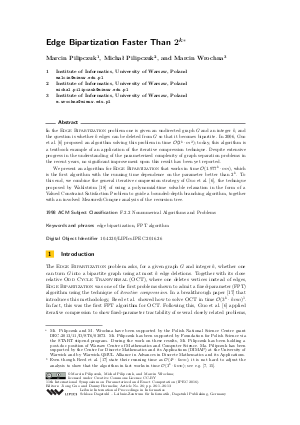Edge Bipartization Faster Than 2^k
Authors Marcin Pilipczuk, Michal Pilipczuk, Marcin Wrochna
-
Part of:
Volume:
11th International Symposium on Parameterized and Exact Computation (IPEC 2016)
Part of: Series: Leibniz International Proceedings in Informatics (LIPIcs)
Part of: Conference: International Symposium on Parameterized and Exact Computation (IPEC) - License:
 Creative Commons Attribution 3.0 Unported license
Creative Commons Attribution 3.0 Unported license
- Publication Date: 2017-02-09
File

PDF
LIPIcs.IPEC.2016.26.pdf
- Filesize: 0.54 MB
- 13 pages
Document Identifiers
Subject Classification
Keywords
- edge bipartization
- FPT algorithm
Metrics
- Access Statistics
-
Total Accesses (updated on a weekly basis)
0Document
0Metadata
Abstract
In the EDGE BIPARTIZATION problem one is given an undirected graph G and an integer k, and the question is whether k edges can be deleted from G so that it becomes bipartite. In 2006, Guo et al. [J. Comput. Syst. Sci., 72(8):1386-1396, 2006] proposed an algorithm solving this problem in time O(2^k m^2); today, this algorithm is a textbook example of an application of the iterative compression technique. Despite extensive progress in the understanding of the parameterized complexity of graph separation problems in the recent years, no significant improvement upon this result has been yet reported. We present an algorithm for Edge Bipartization that works in time O(1.977^k nm), which is the first algorithm with the running time dependence on the parameter better than 2^k. To this end, we combine the general iterative compression strategy of Guo et al. [J. Comput. Syst. Sci., 72(8):1386-1396, 2006], the technique proposed by Wahlström [SODA'14] of using a polynomial-time solvable relaxation in the form of a Valued Constraint Satisfaction Problem to guide a bounded-depth branching algorithm, and an involved Measure&Conquer analysis of the recursion tree.
Cite As Get BibTex
Marcin Pilipczuk, Michal Pilipczuk, and Marcin Wrochna. Edge Bipartization Faster Than 2^k. In 11th International Symposium on Parameterized and Exact Computation (IPEC 2016). Leibniz International Proceedings in Informatics (LIPIcs), Volume 63, pp. 26:1-26:13, Schloss Dagstuhl – Leibniz-Zentrum für Informatik (2017)
https://doi.org/10.4230/LIPIcs.IPEC.2016.26
BibTex
@InProceedings{pilipczuk_et_al:LIPIcs.IPEC.2016.26,
author = {Pilipczuk, Marcin and Pilipczuk, Michal and Wrochna, Marcin},
title = {{Edge Bipartization Faster Than 2^k}},
booktitle = {11th International Symposium on Parameterized and Exact Computation (IPEC 2016)},
pages = {26:1--26:13},
series = {Leibniz International Proceedings in Informatics (LIPIcs)},
ISBN = {978-3-95977-023-1},
ISSN = {1868-8969},
year = {2017},
volume = {63},
editor = {Guo, Jiong and Hermelin, Danny},
publisher = {Schloss Dagstuhl -- Leibniz-Zentrum f{\"u}r Informatik},
address = {Dagstuhl, Germany},
URL = {https://drops.dagstuhl.de/entities/document/10.4230/LIPIcs.IPEC.2016.26},
URN = {urn:nbn:de:0030-drops-69285},
doi = {10.4230/LIPIcs.IPEC.2016.26},
annote = {Keywords: edge bipartization, FPT algorithm}
}
Author Details
References
- Marek Cygan, Holger Dell, Daniel Lokshtanov, Dániel Marx, Jesper Nederlof, Yoshio Okamoto, Ramamohan Paturi, Saket Saurabh, and Magnus Wahlström. On problems as hard as CNF-SAT. ACM Trans. Algorithms, 12(3):41, 2016. URL: http://dx.doi.org/10.1145/2925416.
- Marek Cygan, Łukasz Kowalik, and Marcin Pilipczuk. Open problems from the update meeting on graph separation problems, Workshop on Kernels, Warsaw, 2013. URL: http://worker2013.mimuw.edu.pl/slides/update-opl.pdf.
- Marek Cygan, Marcin Pilipczuk, Michał Pilipczuk, and Jakub Onufry Wojtaszczyk. On Multiway Cut parameterized above lower bounds. TOCT, 5(1):3, 2013. URL: http://dx.doi.org/10.1145/2462896.2462899.
- Fedor V. Fomin and Dieter Kratsch. Exact Exponential Algorithms. Texts in Theoretical Computer Science. An EATCS Series. Springer, 2010. URL: http://dx.doi.org/10.1007/978-3-642-16533-7.
- Sylvain Guillemot. FPT algorithms for path-transversal and cycle-transversal problems. Discrete Optimization, 8(1):61-71, 2011. URL: http://dx.doi.org/10.1016/j.disopt.2010.05.003.
-
Jiong Guo, Jens Gramm, Falk Hüffner, Rolf Niedermeier, and Sebastian Wernicke. Compression-based fixed-parameter algorithms for feedback vertex set and edge bipartization. J. Comput. Syst. Sci., 72(8):1386-1396, 2006.

-
Falk Hüffner. Algorithm engineering for optimal Graph Bipartization. J. Graph Algorithms Appl., 13(2):77-98, 2009.

- Yoichi Iwata, Magnus Wahlström, and Yuichi Yoshida. Half-integrality, lp-branching, and FPT algorithms. SIAM J. Comput., 45(4):1377-1411, 2016. URL: http://dx.doi.org/10.1137/140962838.
- Sudeshna Kolay, Pranabendu Misra, M. S. Ramanujan, and Saket Saurabh. Parameterized approximations via d-Skew-Symmetric Multicut. In Proc. MFCS'14, volume 8635 of Lecture Notes in Computer Science, pages 457-468. Springer, 2014. URL: http://dx.doi.org/10.1007/978-3-662-44465-8_39.
- Sudeshna Kolay, Fahad Panolan, Venkatesh Raman, and Saket Saurabh. Parameterized algorithms on perfect graphs for deletion to (r, l)-graphs. In Piotr Faliszewski, Anca Muscholl, and Rolf Niedermeier, editors, Proc. MFCS'14, volume 58 of LIPIcs, pages 75:1-75:13. Schloss Dagstuhl-Leibniz-Zentrum fuer Informatik, 2016. URL: http://dx.doi.org/10.4230/LIPIcs.MFCS.2016.75.
-
Vladimir Kolmogorov, Johan Thapper, and Stanislav Živný. The power of linear programming for general-valued CSPs. SIAM J. Comput., 44(1):1-36, 2015.

-
Stefan Kratsch and Magnus Wahlström. Compression via matroids: A randomized polynomial kernel for Odd Cycle Transversal. ACM Trans. Algorithms, 10(4):20:1-20:15, 2014.

-
Daniel Lokshtanov, Dániel Marx, and Saket Saurabh. Lower bounds based on the Exponential Time Hypothesis. Bulletin of the EATCS, 105:41-72, 2011.

- Daniel Lokshtanov, N. S. Narayanaswamy, Venkatesh Raman, M. S. Ramanujan, and Saket Saurabh. Faster parameterized algorithms using linear programming. ACM Trans. Algorithms, 11(2):15:1-15:31, 2014. URL: http://dx.doi.org/10.1145/2566616.
- Daniel Lokshtanov, Saket Saurabh, and Somnath Sikdar. Simpler parameterized algorithm for OCT. In Jirí Fiala, Jan Kratochvíl, and Mirka Miller, editors, Proc. IWOCA 2009, Revised Selected Papers, volume 5874 of Lecture Notes in Computer Science, pages 380-384. Springer, 2009. URL: http://dx.doi.org/10.1007/978-3-642-10217-2_37.
-
Dániel Marx. What’s next? Future directions in Parameterized Complexity. In The Multivariate Algorithmic Revolution and Beyond, volume 7370 of Lecture Notes in Computer Science, pages 469-496. Springer, 2012.

-
Bruce A. Reed, Kaleigh Smith, and Adrian Vetta. Finding odd cycle transversals. Oper. Res. Lett., 32(4):299-301, 2004.

-
Magnus Wahlström. Half-integrality, LP-branching and FPT algorithms. In Proc. SODA'14, pages 1762-1781. SIAM, 2014.

